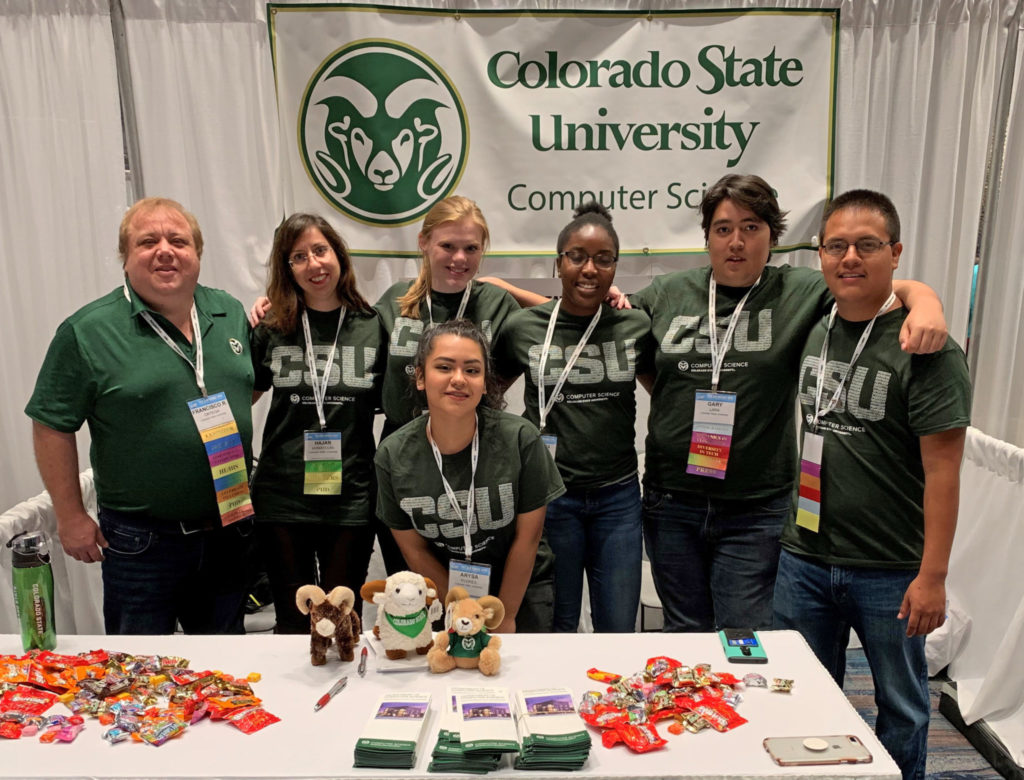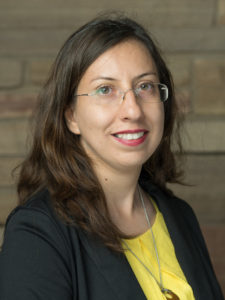
Life is full of firsts. First airplane flight. First view of the ocean. First place awards.
This fall, the Department of Computer Science sent its first group of students ever to the annual Richard Tapia Celebration of Diversity in Computing (Tapia) Conference.
Undergraduates Susanna Kyler, Gary Lara, Arysa Flores, Miguel Guerrero, Augusta Irechukwu, and Ph.D. student Hajar Homayouni, accompanied by computer science assistant professor Francisco Ortega, traveled to San Diego and immersed themselves in the inclusive conference.
For three days they presented research, networked and interviewed, learned from industry experts, rubbed elbows with 2,000 participants, and racked up more firsts.
Not your average diversity conference
In the sea of conferences focused on people’s differences, like gender, race, or ethnicity, Tapia is different. It is a computer science conference rooted in inclusion, embracing those differences.
The CSU students and faculty relished the unique atmosphere that welcomed all forms of diversity including the sometimes overlooked LGBTQ+ and disabled communities.
“Other conferences focus on their slice of diversity,” said senior Susanna Kyler. “At Tapia, we are all in this together.”
A rich menu of conference activities included workshops, panels and tech talks, a career fair, a poster presentation, and keynotes from industry leaders Stephanie Lampkin, Founder & CEO of Blendoor, Hector Ruiz, Founder and Director at ANSI Capital, and Ken Washington, Chief Technology Officer, Ford Motor Company.
Receptions, dinners, and dancing filled the evenings along with after-hours events offered by special interest groups such as LatinX, Hispanics in Computer Science, and Explore San Diego. A favorite was the ACM-sponsored visit to national historic landmark Chicano Park, complete with food and Aztec dancers.
This year’s Tapia conference theme, “Building a Stronger Future,” highlighted the critical role diversity plays in computing innovation and the future of STEM. CSU is expected to be an emerging Hispanic institution by the late 2020s.
Started in 2001, Tapia brings together computing students, faculty, researchers, and professionals to learn, connect, and inspire one another. The conference is named for professor Richard Tapia, internationally known for his research in the computational and mathematical sciences. It is sponsored by the Association for Computing Machinery (ACM) and presented by the Center for Minorities and People with Disabilities in Information Technology (CMD-IT).
It’s about the connections
Gary Lara, a junior first-generation student, wanted the inside scoop on the computer science profession. At Tapia, he found that and an expanded view of diversity. “I grew up in a majority Latino community and didn’t understand diversity until I came to CSU,” he said. On this trip, he also checked off some firsts – first conference, first time flying, and first time out of Colorado. He encourages his fellow Rams, “as a first gen student, it is scary coming to college not knowing what to do. Be open to experiences, and get out there and try.”
Tapia’s smaller size and personal connection appealed to senior Susanna Kyler who was looking for job opportunities. Tapia is less crowded than large events like Grace Hopper, and there are no long lines to talk to employers. “Your odds of getting one-on-one time with an employer are much higher,” Kyler said. “The companies at smaller conferences like this really want to talk to you.”
Miguel Guerrero maximized the opportunity. This was the first time flying, first view of the ocean, and first conference for the senior first-generation student. “It was rewarding, and I really broke out of my comfort zone,” he said. The conference’s Hispanic community also resonated with Guerrero. “Coming from a degree where there are few Hispanics, it was nice to see the number of Hispanic students.”

Ph.D. student Hajar Homayouni was pondering a decision – a career in academia or industry? Tapia offered her personal conversations and insight from professionals in both areas. Connections spilled over after hours to dinner with Virginia Tech faculty and meeting with special interest group Iranian Women in Computing.
Dedicated to improving her research, Homayouni presented a poster in the ACM student research competition and was awarded first place in the graduate division which included a monetary prize. Her exceptional work is already well recognized. Homayouni has received the Western Association of Graduate Schools (WAGS)/ProQuest Distinguished Master’s Thesis Award and other awards and fellowships.
Not only students benefited from attending Tapia. Assistant Professor Francisco Ortega met with collaborators, funders, and prospective graduate students and faculty candidates. Feeling a responsibility to give back, Ortega serves as a conference poster judge and scholarship reviewer. “It was nice to see our students happy, relaxed, and confident,” he said. “I hope they learned at Tapia that diversity and inclusiveness promote better teams.”
The Department of Computer Science gratefully acknowledges support for student attendance at Tapia from donors, the Colorado-Wyoming Louis Stokes Alliance for Minority Participation (CO-WY AMP), and Tapia conference scholarships.
The Department of Computer Science is in the College of Natural Sciences.